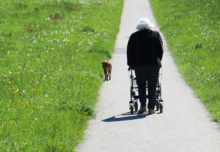The Challenges of Aging Alone: The Solo Senior
Written by Rita Roling
If you age solo make sure you create a safety net
Sven and I met many years ago when we both attended a workshop. Although our private lives are vastly different, we have kept in touch. Sven grew up in Sweden, and as I lived in Stockholm for several years we are able to reminisce about the “old country” in Swedish. Sharing a non mainstream language and culture creates a bond that opens the door for more intimate conversations and that is what occurred when we last met. “I am about to retire” Sven said “and I am afraid of what will happen to me. I live alone, have no relatives and my only friends are those from work. Who will know if I get sick or have a bad fall? If I don’t show up for work someone from the office will call and ask why I am not there, but when I retire there is nobody.” Sven said that he had never thought about growing older and being alone. He had made no plans for life after retirement and felt confused, frightened and at a loss. My friend was on the threshold to enter the world of elder orphans.
Rob Carrick, of The Globe and Mail defines elder orphans as a “term for people who are aging without a spouse or children.” This demographic group is also referred to as solo agers. It used to be that marriage and family was a guarantee against growing old alone. Spouses cared for each other and when this was no longer feasible, adult children would step in. But society is not static. The latest Canada census (2018) tells us that: one in four marriages ends in divorce, more adults choose to stay single and childless, birthrates are declining, and longevity rates are increasing. Family dynamics also change; some members may be estranged, others leave their home communities to seek opportunities elsewhere. Thus it is not a ‘given’ that families will always provide that security blanket.
Create a comprehensive realistic plan
Carol Marak is a strong advocate for elder orphans. She adamantly urges single seniors to create an honest long-term care and retirement plan. She suggests that besides the contact information of your medical care-givers the plan should include: the name of the person(s) who will advocate for you, a budget which will allow you to live within your means, personal safety and medical intervention preferences, transportation and preferred housing needs, and your likes and dislikes. Upon completion of this difficult and soul-searching task, give one copy to your trusted advocate and hang another one on the refrigerator door. Expect to amend it because as time goes by your needs may change.
Isolation is a looming public health threat
Janet Adamy and Paul Overberg in their article in the Wall Street Journal examine possible repercussions for older solo seniors. “Baby boomers are aging alone more than any generation in U.S. history and the resulting loneliness is a looming public health threat…Social isolation takes a physical toll, and is as closely linked to early mortality as smoking 15 cigarettes a day or consuming more than six alcoholic drinks a day. Loneliness is even worse for longevity than being obese or physically inactive.”
The harsh reality requires action now
Some new approaches have already taken place. In 2002 a group of Boston seniors formed a supportive “village” so they could help each other with networking, social activities and old-age planning. This village has now mushroomed into 350 groups known as the Village to Village Network. Meals on Wheels America has developed an app to track meal recipients who share that they feel isolated. If consenting they are referred to a care coordinator. Closer to home, the Jewish Seniors Alliance delivers several supportive services for seniors such as peer counseling, friendly visitors, and regular phone calls. Several non-profit organizations operate wellness clinics where older adults can have their blood pressure measured, receive dietary and other health information and have coffee and chat with peers. A practical solution to evade loneliness is house-sharing. An older person with extra space offers to rent a room at a reduced rate in exchange for minor chores and companionship. Some community organizations administer home sharing rental registries and will make suitable recommendations. Many seniors live on a small income and may have a hard time to make ends meet, so renting out space may be a win-win situation.
Judith Graham of the Washington Post cites a survey by Dr. Maria Carney which indicates that 22 percent of older US adults will age alone. Of the 500 surveyed, 70% had not prepared a retirement plan or identified an individual who would step in and help when needed. Sadly, 35% stated that they did not have friends or family to help them cope with life’s challenges.” All elder orphans deserve to have dignity and as good a quality of life as possible.
Ms. Marak, as the chief public relations officer for the Elder Orphan Facebook Group, challenges all levels of government, policymakers, and business leaders to develop solutions that will improve lives and allow people to age successfully. She is not alone, Rob Carrick calls for the “personal finance world to step up their game in the provision of advice tailored to solo seniors.” Just like it takes a village to raise a child, it takes a village to support elder orphans. Medical intervention alone can easily depersonalize individuals but when it is in combination with the media, legal, financial, governments and other social support systems, it can be effective and empowering.





